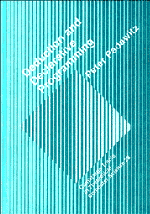Book contents
Summary
This monograph promotes specification and programming on the basis of Horn logic with equality. As was pointed out in [Pad88a], this theoretical background equips us with a number of deductive methods for reasoning about specifications and designing correct programs. The term declarative programming stands for the combination of functional (or applicative) and relational (or logic) programming. This does not rule out the design of imperative programs with conditionals, loops and sequences of variable assignments, since all these features have functional or relational equivalents. In particular, variables become “output parameters” of functions. Hence the static view of declarative programming is not really a restriction. Only if correctness conditions concerned with liveness or synchronization are demanded, transition relations must be specified for fixing the dynamics of program execution (cf. Sect. 6.6).
Design specifications
With regard to the overall software design process, the methods considered here are tailored to design specifications, each consisting of a many-sorted signature SIG denoting data, functions and predicates to be specified and a set of Horn clauses over SIG, allowing more or less abstract presentations of declarative programs and the data structures they use and manipulate (cf. Sects. 1.1 and 1.2). Associated with a design specification DS is a requirement specification, the conjecture section of DS, which consists of correctness conditions on DS. In contrast to design axioms, Horn clauses are not always sufficient for specifying requirements. Hence we admit positive Gentzen clauses, which may involve disjunctions and existential quantifiers, in a requirement specification (cf. Sect. 1.4).
- Type
- Chapter
- Information
- Deductive and Declarative Programming , pp. 1 - 7Publisher: Cambridge University PressPrint publication year: 1992



